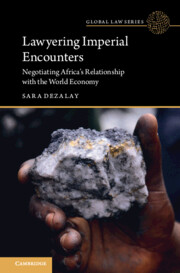Book contents
- Lawyering Imperial Encounters
- Global Law Series
- Lawyering Imperial Encounters
- Copyright page
- Contents
- Acknowledgements
- Abbreviations
- Introduction
- 1 Imperial Encounters
- 2 Indirect Rule and Middle Power
- 3 Gatekeeper States and Offshore Capitalism
- 4 The New Scramble, Deregulation, Re-regulation
- 5 Bujumbura
- 6 Abidjan
- 7 Paris
- 8 The Value of Social Class in Global Justice
- Conclusion
- References
- Index
5 - Bujumbura
Hyperviolence and Hyperlegality
Published online by Cambridge University Press: 19 December 2024
- Lawyering Imperial Encounters
- Global Law Series
- Lawyering Imperial Encounters
- Copyright page
- Contents
- Acknowledgements
- Abbreviations
- Introduction
- 1 Imperial Encounters
- 2 Indirect Rule and Middle Power
- 3 Gatekeeper States and Offshore Capitalism
- 4 The New Scramble, Deregulation, Re-regulation
- 5 Bujumbura
- 6 Abidjan
- 7 Paris
- 8 The Value of Social Class in Global Justice
- Conclusion
- References
- Index
Summary
Chapter 5 examines the ongoing rush for Burundi’s rare earths twenty-five years after the Arusha agreement that put an end to the violent conflict that tore the country apart from 1993. It argues that Burundi’s transition into an origination site leans on the legacy of colonial, post-independence and post-1993 rule of law reforms which together have fostered what Mamdani (1996) calls ‘decentralized despotism’. The conflicting position of lawyers as either representatives of authoritarian power or champions of the rule of law is embedded in a structural bifurcation of the Burundian legal field that enables corporate predation, like that of beer giants. According to their political and social resources, lawyers are positioned alternately as gatekeepers of the rent of exported commodities, or vulnerable to another type of extraversion, aid dependency. This bifurcation makes Burundi a Petri dish of the hyper violence generated by the hyperlegality of late capitalism.
Keywords
Information
- Type
- Chapter
- Information
- Lawyering Imperial EncountersNegotiating Africa's Relationship with the World Economy, pp. 125 - 153Publisher: Cambridge University PressPrint publication year: 2025
